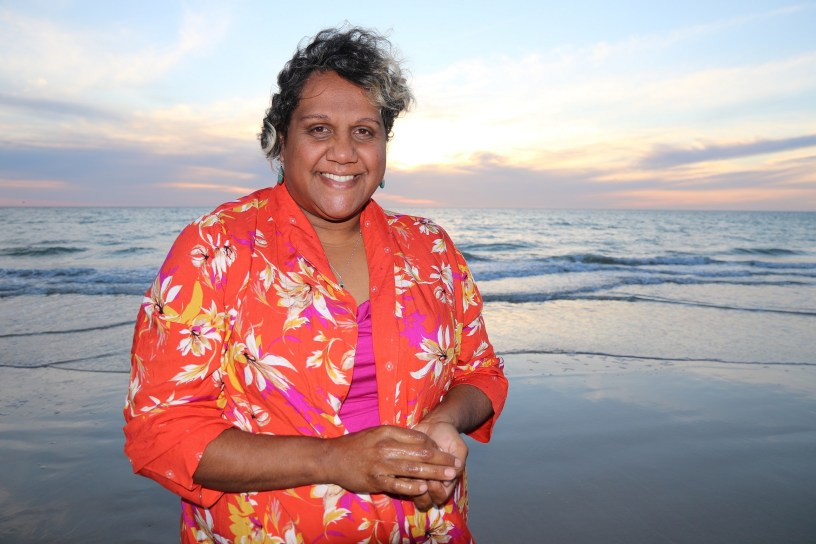Elaine Crombie delivered the second annual NAIDOC Week Lecture at NIDA this week, drawing attention to training programs and her own experience as a First Nations creative.
Crombie, a Pitjantjatjara, Warrigmal, South Sea and German-descended actor, singer, songwriter and writer from South Australia, discussed the importance of First Nations people standing together in the arts.
A self-described “older woman in this game”, Crombie has noticed upcoming comedic talent “blitzing past”. But she emphasised there is nothing helpful about looking at newcomers with “side eyes and head tilts”.
“Being black and in the arts, we can’t do that. We have to always lead with love and celebrate each other,” she said.
“I purposely love everybody, and champion everybody.”
Crombie acknowledged the work NIDA is doing as an educational institution, but also questioned if there is enough Indigenous-controlled spaces to nurture new talent. She particularly highlighted the effect NAISDA Dance College had on the career of her mother, Lillian.
Crombie herself studied at the Adelaide University’s Centre for Aboriginal Studies in Music (CASM), and then later the Aboriginal Centre for Performing Arts (ACPA) in Brisbane. There she made her “first artistic family”, with most of those connections still part of her career today. Among them was future Black Comedy co-star Steven Oliver.
“I don’t know if we have that anymore, that place that can grow black talent like that,” she said.
“I just know where I started, and it wasn’t at places like NIDA.”

Crombie, whose credits include Top End Wedding, 8MMM Aboriginal Radio and Kiki and Kitty, is currently touring as the sole performer in the Sydney Theatre Company production The 7 Stages of Grieving.
The show, directed by Shari Sebbens, and written by Deborah Mailman and Wesley Enoch, is a retelling of the 1995 version and chronicles the seven phases of Aboriginal history.
Crombie felt the play represented many of her own feelings about the ongoing campaign of Indigenous people.
“I’m 40 and I still feel like I’m pushing mud up a hill in some respects, but mud’s good. We can build houses out of mud and make mud bricks.
“At the end of the day it is about a call to action.”
Also discussed was the effect of online spaces on the acting industry, with Crombie – a big fan of TikTok – noting there was huge potential in social media platforms for young performers’ careers.
“Moving through your careers as artists, you have to move with the times,” she said.
“These days it’s all about TikTok, Instagram, and online, doing reels of 15 seconds.
“If you can challenge yourself, and you are online creating content and you’re happy with the content, when it comes around to auditions that stuff will be second nature.”
Crombie started her career as a singer and is hoping to return to music in the near future.
“Next year I’m hoping to put in an application for Adelaide Fringe and get a whole bunch of musos together and create this show just for song.
“I’ve done a lot of acting, I’ve been at the will of a lot of directors, and I’d like to revisit, even if it’s just for a season, or a festival, my roots as a singer.”
As for young professionals at the beginning of their careers, Crombie offered: “work out what you love and do that.”
“If your passion is acting, then you just have to stick at it… Those roles that you want are coming. Even if you have to create those roles, then that’s a whole other creative skill set that you can bring to the table in order to create a space for you.
“If your space isn’t there, then you have to go out and carve out that space. But trust me, that space is out there for you.”
As part of NAIDOC programming across various broadcasters, Crombie can be seen on NITV this weekend in History Bites Back with Trisha Morton-Thomas and Oliver, and in 10 play web series Stuff Everyone Should Know About Australia (season 2).


